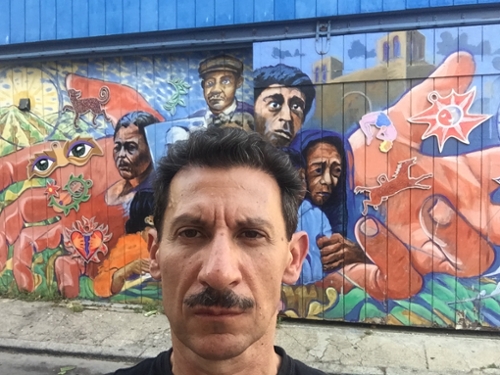Critical Epistemology, Knowing through Gender and the Decolonial
This collaborative project—between Professor of Philosophy José Medina (Northwestern) and then doctoral student Cintia Martinez Velasco (UNAM, Mexico)—focused on Latin-American and Latinx feminisms and gender theories, with a particular emphasis on gender issues in the global South and decolonial approaches to feminism and queer theory. Medina and Martinez Velasco developed interdisciplinary syllabi that critically interrogate the intersections of gender, sexuality and Latinidad. A complementary bibliography on the theme of critical epistemologies was also produced for the collaboration by Taylor Rogers and is available here.
Participants
 José Medina is Walter Dill Scott Professor of Philosophy and affiliated faculty in the Critical Theory Cluster and the Department of African American Studies at Northwestern University. He works in critical race theory, gender/queer theory, communication theory, critical epistemology, and political philosophy. His books include Speaking from Elsewhere (SUNY Press, 2006), and The Epistemology of Resistance (Oxford University Press, 2012), which received the 2012 North-American Society for Social Philosophy Book Award. His current projects in critical race theory, social epistemology, and gender and queer theory focus on how social perception and the social imagination contribute to the formation of vulnerabilities to different kinds of violence and oppression. These projects also explore the social movements and kinds of activism (including epistemic activism) that can be mobilized to resist racial and sexual violence and oppression in local and global contexts.
José Medina is Walter Dill Scott Professor of Philosophy and affiliated faculty in the Critical Theory Cluster and the Department of African American Studies at Northwestern University. He works in critical race theory, gender/queer theory, communication theory, critical epistemology, and political philosophy. His books include Speaking from Elsewhere (SUNY Press, 2006), and The Epistemology of Resistance (Oxford University Press, 2012), which received the 2012 North-American Society for Social Philosophy Book Award. His current projects in critical race theory, social epistemology, and gender and queer theory focus on how social perception and the social imagination contribute to the formation of vulnerabilities to different kinds of violence and oppression. These projects also explore the social movements and kinds of activism (including epistemic activism) that can be mobilized to resist racial and sexual violence and oppression in local and global contexts.
 Cintia Martinez Velasco received her PhD in Philosophy at the National Autonomous University of Mexico (UNAM), from which she also holds bachelor’s and master’s degrees in Philosophy. She is Adjunct Professor in the Philosophy Department at UNAM, where in 2017 she set up the course “Debates on Feminist Philosophy” in the Faculty of Philosophy and Literature. She is a board member of the International Association of Women Philosophers. The main topics of her research are feminist philosophy and decolonial philosophy, with special attention on third-wave feminism, Latin American philosophy, and metaphysics of sex and gender. Professor Martinez has been a guest student at the University of Pennsylvania, and she was a member of the Bartolomé de las Casas Research Group under the supervision of the decolonial philosopher Santiago Castro-Gomez. She has participated and organized national and international conferences on feminist philosophy. The latest and most important have been (as organizer) the Workshop on Gender, Ethics and Politics (2017) and the International Congress of Feminism and Marxism: Neoliberalism and Work (2018-2019), and (as participant) the XVIIth Symposium of the International Association of Women Philosophers, Beijing.
Cintia Martinez Velasco received her PhD in Philosophy at the National Autonomous University of Mexico (UNAM), from which she also holds bachelor’s and master’s degrees in Philosophy. She is Adjunct Professor in the Philosophy Department at UNAM, where in 2017 she set up the course “Debates on Feminist Philosophy” in the Faculty of Philosophy and Literature. She is a board member of the International Association of Women Philosophers. The main topics of her research are feminist philosophy and decolonial philosophy, with special attention on third-wave feminism, Latin American philosophy, and metaphysics of sex and gender. Professor Martinez has been a guest student at the University of Pennsylvania, and she was a member of the Bartolomé de las Casas Research Group under the supervision of the decolonial philosopher Santiago Castro-Gomez. She has participated and organized national and international conferences on feminist philosophy. The latest and most important have been (as organizer) the Workshop on Gender, Ethics and Politics (2017) and the International Congress of Feminism and Marxism: Neoliberalism and Work (2018-2019), and (as participant) the XVIIth Symposium of the International Association of Women Philosophers, Beijing.
Project Syllabus
Project Bibliography
Watch José Medina and Cintia Martinez Velasco speak more on the project here.
Critical Epistemologies - Background Reading
Alcoff, Linda. Visible Identities, Race, Gender, and the Self.Oxford University Press, 2006.
Anzaldúa, Gloria. Borderlands/La Frontera: The New Mestiza. San Francisco: Spiters/Aunt Lute, 1987.
Cabrera, Marta. “Transfeminismo, decolonialidad y el asunto del conocimiento: algunas inflexiones de los feminismos disidentes contemporáneos.” En Universitas Humanística78, no. 28, (Julio-Diciembre 2014): 19–37.
Castellanos, Rosario. Balún Canán. México: Fondo de Cultura Económica, 1957.
———. Oficio de tinieblas. México: Libros del silencio, 2009.
———. Rito de iniciación. México: Alfaguara, 1996.
Cruz, Sor Juana de la. Obras completas. México: Fondo de Cultura Económica, 1957.
Espinosa, Yuderkys y Diana Gómez (eds.). Tejiendo de otro modo: Feminismo, epistemología y apuestas descoloniales en Abya Ayala. Colombia: Universidad del Cauca, 2014.
Gargallo, F. Feminismos desde Abya Yala. Ideas y preposiciones de las mujeres de 607 pubelos en nuestra América. Ciudad de México: Editorial Corte y confección, 2014.
———.Ideas feministas latinoamericanas. Universidad de la Ciudad de México, 2004.
Hierro, Graciela. Ética y feminismo. Universidad Nacional Autónoma de México, 1985.
———. Ética de la libertad. México: Editorial Fuego Nuevo, 1990.
Lugones, María. “Toward a decolonial feminism.” Hypatia25, no. 4 (Fall 2010).
———. Pilgrimages/Peregrinajes: Theorizing Coalition Against Multiple Oppressions.Rowman & Littlefield Publishers, 2003.
Masson, Sabine and Jules Falquet, (eds.). Nouvelles Questiones Féministes24, no. 2 (2005).
Medina, José, Andrea Pitts, and Mariana Ortega. Theories of the Flesh: Latinx and Latin American Feminism, Transformations, and Resistance(forthcoming). 2019.
Mendoza, Breny. Ensayos de crítica feminista en Nuestramerica. México: Herder, 2014.
Moraga, Cherrie y Ana Castillo. This Bridge Called my Back. Writings by Radical Women of Color.Kitchen Table Press, 1993.
Ortega, Mariana. In between, Latina Feminist Phenomenology, Multiplicity, and the Self. SUNY Press, 2016.
Schutte, Ofelia. Cultural Identity and Social Liberation in America Latina. SUNY Press, 1983.
Segato, Rita Laura. Las nuevas formas de la guerra y el cuerpo de las mujeres. México: Pez en el árbol, 2014.
———. Las estructuras elementales de la violencia. Universidad Nacional de Quilmes, 2003.
———. La crítica a la colonialidad en ocho ensayos y una antropología por demanda. Prometeo Libros, Argentina, 2013.
Suarez, Liliana y Aida Hernández (eds.). Descolonizando el feminismo, Teorías y prácticas desde los márgenes. Madrid: Cátedra, 2008.
Critical Epistemologies - Extensive Bibliography
An extensive bibliography of Critical Epistemologies resources, broken down by sub-topic, is available here.
This bibliography was compiled by Taylor Rogers, who is pursuing her Ph.D. in Philosophy at Northwestern.
Taylor Rogers is a PhD student in the Department of Philosophy at Northwestern University. She is part of the Gender and Sexuality Studies certificate and Critical Theory cluster programs. She holds a BA in Philosophy and Third-World Studies from Oberlin College, and an MA in Philosophy from Indiana University. Her research draws from a variety of disciplines including political and social epistemology, critical race theory, gender and sexuality studies, affect theory, and aesthetics. She is particularly interested in the mobilization of aesthetic experience for resisting the emotional numbness at the heart of systems of oppression. As part of the project, she is creating a film funded by Northwestern’s Center for the Interdisciplinary Research in the Arts.

